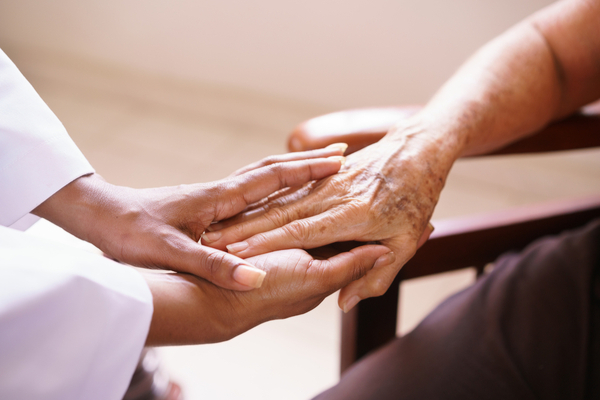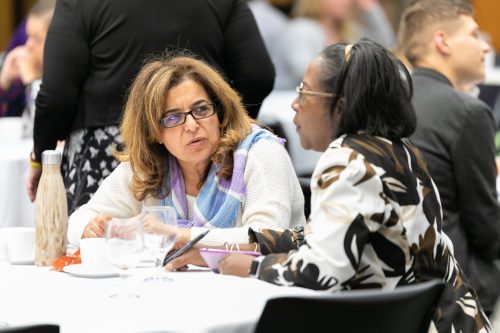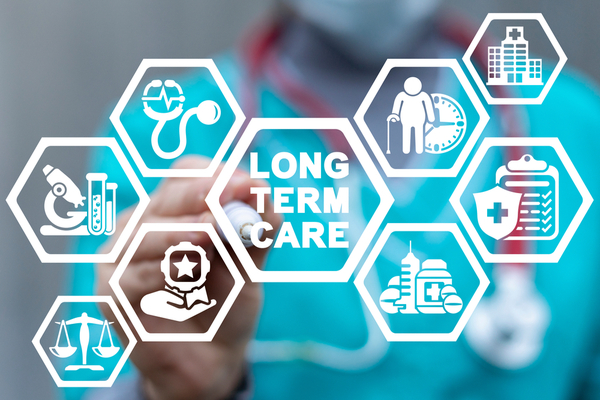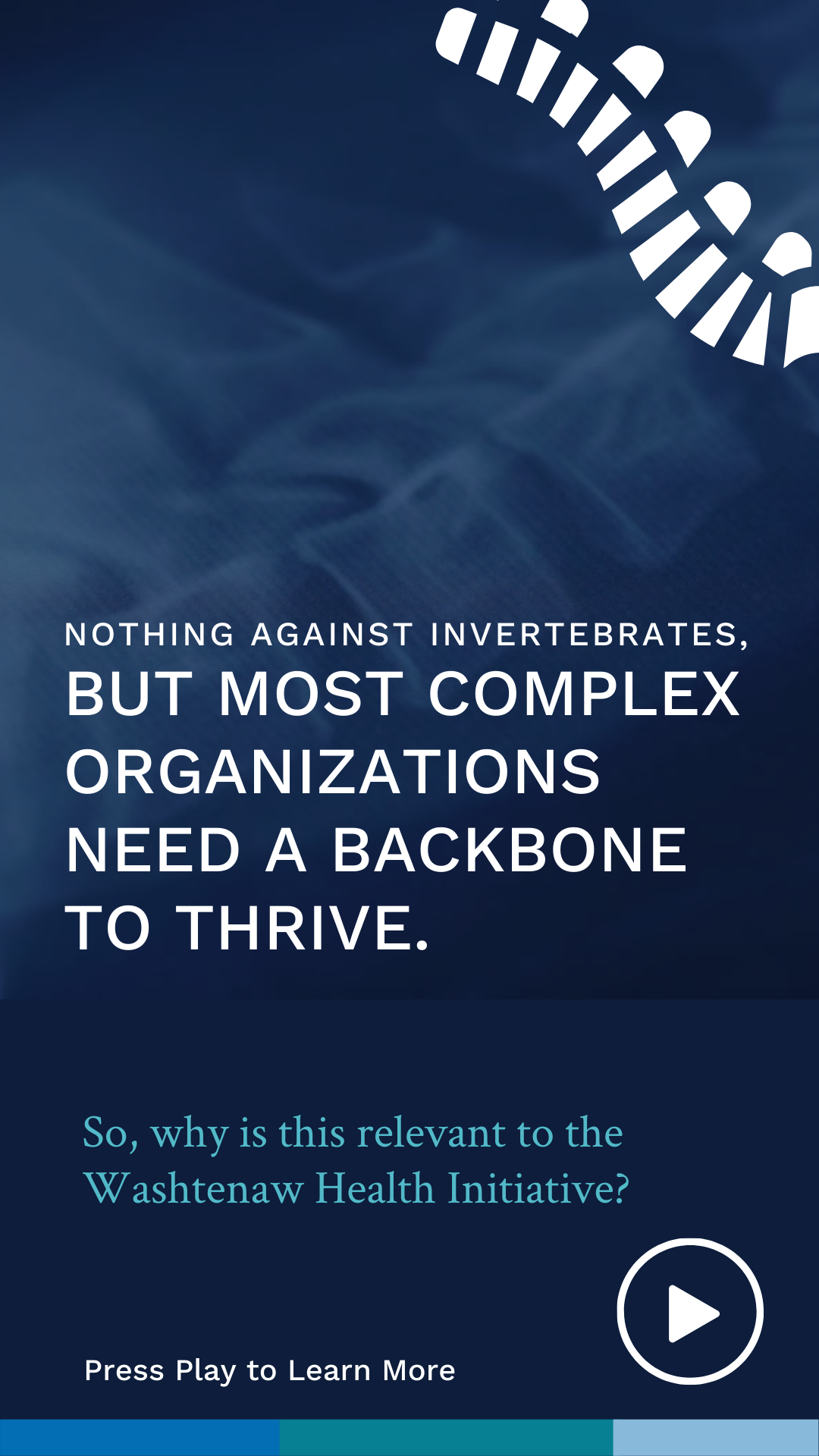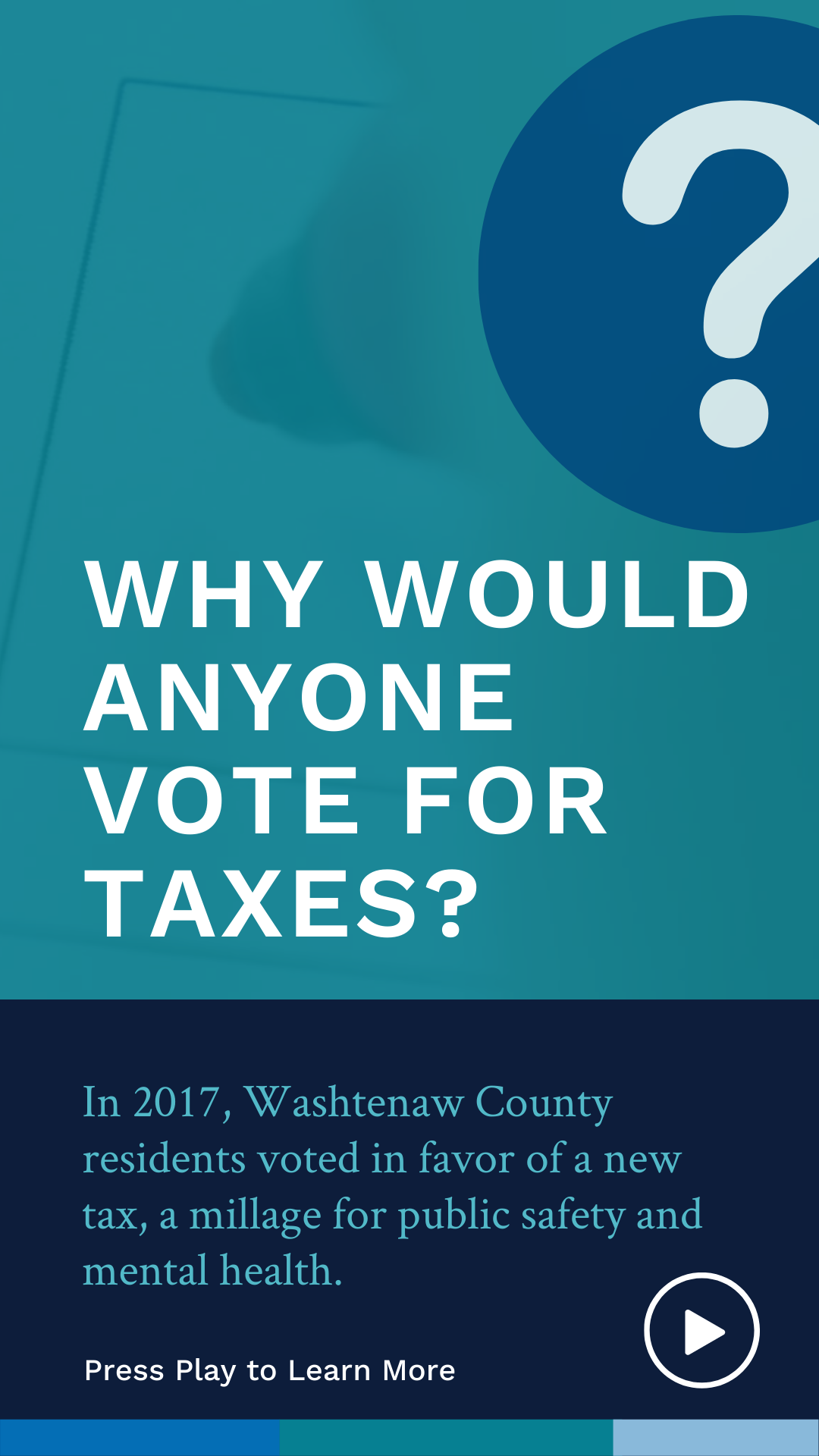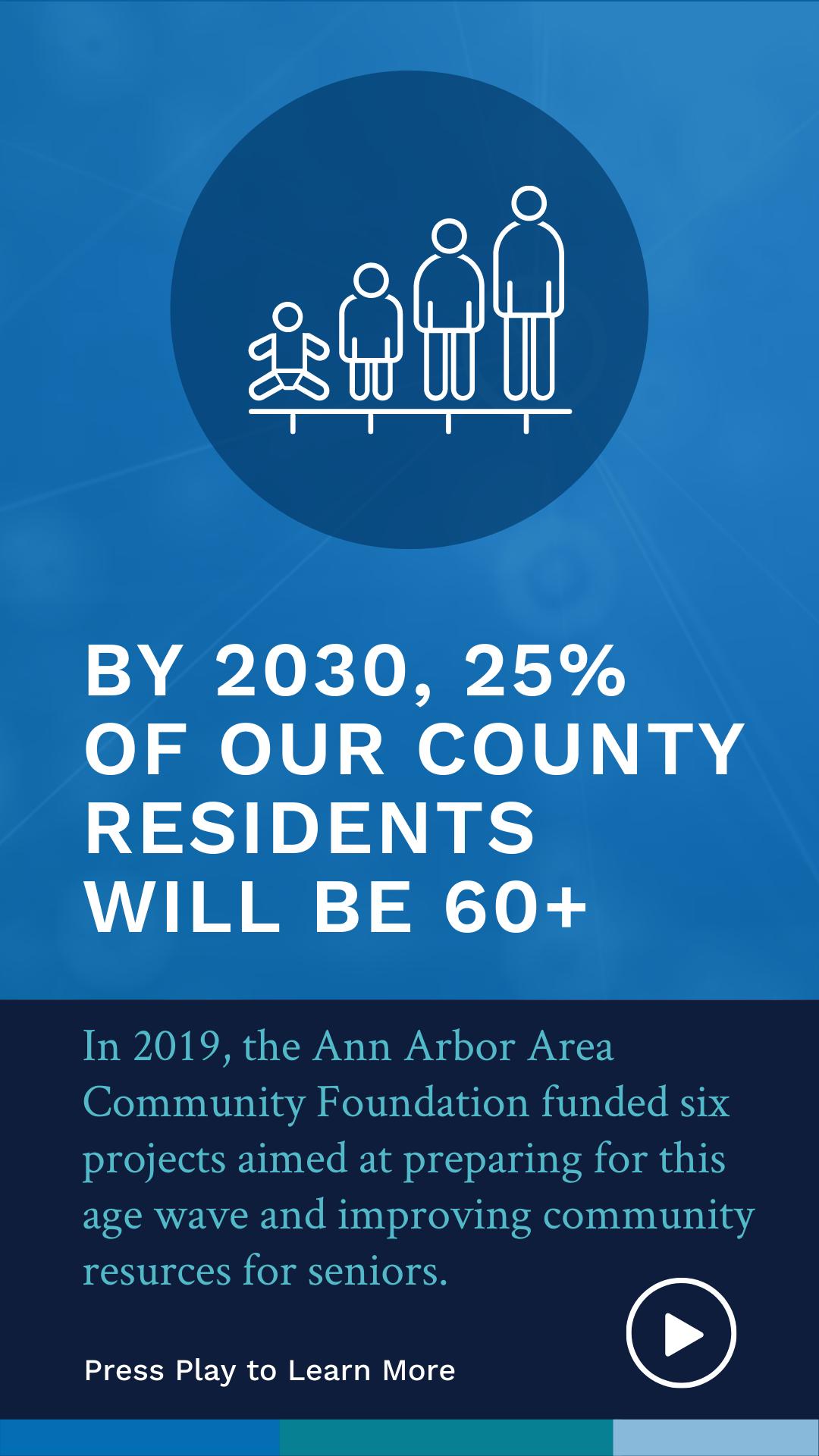
Sweeping health care reform
Concept paper on ACA implementation fuels idea for the WHI
Robert Laverty, CEO of the St. Joseph Mercy Health System, began to disseminate a “concept paper for countywide planning” detailing potential impacts of the implementation of the Patient Protection and Affordable Care Act. The paper also included suggestions of how the county should respond.
“Washtenaw County and environs has had a longstanding dilemma of providing effective access to primary care for persons with limited financial resources and/or limited insurance,” Laverty wrote.
With the passage of health reform, Washtenaw County leaders anticipated that a greater number of persons with limited resources would be insured, increasing their potential access to care.
Without a well-conceived action plan that responds to the impending changes, Laverty and others worried about overwhelming the county’s health care providers, about persons newly eligible for insurance failing to apply or becoming frustrated by the application process, and about safety net providers not qualifying for new types of funding for medical homes, federally qualified health centers, and accountable care organizations.
First meeting
The concept paper and following informal discussions demonstrated a recognition that while Washtenaw County had incredible resources, they felt they needed a mechanism for developing and implementing a coordinated plan to improve care for individuals in need of primary and chronic health care services.
The local health systems concurred and agreed to send high-level representatives who would personally attend all meetings and allocate resources to specific initiatives that would reduce reliance on emergency rooms.
By the time the concept paper was delivered, the Center for Healthcare Research and Transformation (CHRT) had been selected to facilitate the work, St. Joseph Mercy Health System and Michigan Medicine had designated leaders to participate, and key organizations in the county had been identified as potential participants.
On Monday, November 8, 2010—just eight months after the passage of the ACA—and following Robert Laverty’s concept paper, a diverse group of health and community leaders from across Washtenaw County met to discuss the implications of the legislation for Washtenaw County residents.
At that time the co-chairs were Bob Guenzel and Norman Herbert, the health system co-sponsors were Rob Casalou and Doug Strong, and the process facilitator was Marianne Udow-Phillips.

Addressing the potential impacts of the ACA
In early 2011, more than three-dozen individuals from 20 community organizations gathered to talk about how they could better serve Washtenaw County’s uninsured and low-income Medicaid population. Group members included representatives from the Saint Joseph Mercy Health System, University of Michigan, United Way, the Washtenaw County Health Department, the University of Michigan School of Public Health, and the Washtenaw Health Plan. Together, they decided that the region needed to assess primary care capacity in Washtenaw County safety-net clinics to ensure local providers could serve all of the residents who would be newly insured under the ACA. They also discussed gaps in care, such as inadequate dental care, for the county’s low-income and uninsured populations. At the time, they anticipated that the project would be a six-month effort to prepare for the successful implementation of the ACA in 2014.
First WHI committees
By Monday, March 7th, during an early meeting of WHI Steering Committee members at the Center for Healthcare Research and Transformation (CHRT) in Ann Arbor, four committees had been established: primary care capacity, dental care, mental health and substance use disorder care, and health insurance enrollment.
On the same day, the Dental Care subcommittee had its first meeting, identifying four barriers to care: limited access to preventive and ongoing dental care for Medicaid and uninsured adults; dental patients presenting with more complex, poverty-related problems; the high cost of dental care; and provider practices and training programs not conducive to treating low-income residents.
Addressing behavioral health concerns
On Monday, March 22nd, the Mental Health and Substance Abuse subcommittee met for the first time. The committee decided to focus on substance use for its first project, and would later begin to develop a resource for primary care physicians who work with residents who struggle with addiction.
First published report
Six months after their first meeting, the WHI published a report: A picture of health care in Washtenaw County. Based on findings from dozens of community conversations, as well as additional research, the report highlighted a series of significant health care challenges for low-income and uninsured populations across Washtenaw County. It estimated that 28,864 individuals were uninsured in 2010. Of those, approximately 13,138 individuals were expected to be newly eligible for Medicaid, because of the ACA; and 10,728 others would likely be able to purchase coverage through the ACA’s new Health Insurance Marketplace. The report also included data on primary care, dental care, and mental health care access challenges in the county.
Through this report, the WHI shared its intentions to help improve access and care for residents, noting “even if the Act never goes into effect, it is apparent that much can and needs to be done to improve access to integrated and coordinated care for the current low-income, uninsured, and Medicaid populations in Washtenaw County.” Upon agreeing to continue the work of the WHI, the Steering Committee asked WHI committees to propose recommendations for future projects.
Continuing the work
At a Steering Committee meeting, WHI leaders discussed recommendations for future projects including boosting primary care capacity, launching an acute dental care pilot, launching a reduced fee dental care referral program, conducting outreach to ensure more qualified families enrolled in Medicaid health insurance, and more. The WHI, which was originally intended to be a six-month effort, would make a lasting impact on Washtenaw County for years to come.
Seven new projects
At the June 28th Steering Committee meeting, the WHI leaders formally outlined seven projects: Primary Care Navigation; Care Navigation; Dental Acute Care Expansion; Dental Reduced Fee Program; Streamlining Medicaid Eligibility as a Beta Test for the State; Medicaid Enrollment; and Community Outreach for Medicaid Enrollment. The projects’ goals and objectives were shared by the two committees.
Four additional recommendations remained in the planning phase: PCP Strategies for Mild to Moderate Mental Illness; Mental Health Care Management; County-Wide Substance Abuse Protocol; and Connecting Medicaid Enrollees with PCPs.
Official launch garners press attention
On July 7, 2011, the WHI website went live and the group issued a local press release that formally announced the formation of the Washtenaw Health Initiative. On the same day, Crain’s Detroit published a story highlighting the WHI’s work: Washtenaw health care collaborative plans for influx of insured patients in 2014, the Ann Arbor News published: U-M, St. Joe’s join new initiative to help Washtenaw brace for federal health care reform, fill coverage gaps. The next day, the University of Michigan published: County leaders unite to meet community’s health care needs.
Early efforts to enroll families in Medicaid
In August, the Medicaid and Marketplace Outreach and Enrollment subcommittee began partnering with local middle schools to enroll families in Medicaid.
Meeting the need for doctors
On September 28th, the Primary Care Capacity Subcommittee met for the first time. In response to an increasing number of residents eligible for health insurance, their focus would be developing a phased approach to increase primary care capacity in Washtenaw County.
The first workgroups
On October 7th, the Steering Committee agreed to restructure committees and subcommittees into the following workgroups: Medicaid and Insurance Exchange Enrollment and Eligibility chaired by Deb Jackson, Primary Care Capacity and Coordination chaired by Tom Biggs, Mental Health and Substance Abuse Care co-chaired by Gregory Dalack and Nancy Baum, Community Outreach and Other Services chaired by Ellen Rabinowitz, and Communications chaired by Liz Conlin. The workgroups were asked to meet monthly to advance their projects. Also at this meeting, the Steering committee looked at the Milwaukee Health Care Partnership as a potential model for a collaborative effort to increase access to health care.
A formal charter for new members
After receiving upwards of seven informal requests to join the WHI throughout the summer, on October 24, the Steering Committee approved the a WHI Charter as a Statement of Commitment for new members.
First project manager
On November 14, 2011, CHRT hired a full-time project manager, Carrie Rheingans, MSW/MPH, to support the WHI. Rheingans would serve in this role until 2020, helping WHI leaders and members achieve many notable goals.
Washtenaw County Health Improvement Plan
At a November 18th Steering Committee meeting, Adreanne Waller presented the 2010 Washtenaw County Health Improvement Plan survey results for benchmarking purposes. The health department uses the Health Improvement Plan survey to track health care trends. Among the important findings in 2010: The county’s uninsurance rate had increased 50 percent over the past decade (to 10.9 percent). Additionally, 17 percent of the county’s Black residents reported that they were unable to fill prescriptions due to cost.
A process for workgroup funding requests
At a December 9th meeting the Steering Committee implemented a two-step financial funding decision-making process. A small subcommittee would review financial needs and proposals from workgroups before bringing them to the Steering Committee for a vote.

The Detox Protocol Guide
In January, the Mental Health and Substance Use Care Work Group sent a draft of its Detox Protocol Guide to local providers for recommendations. The group had been working on this guide since August 2011 with the goal to assess community treatment capacity (e.g., assessment, detox, residential treatment, and recovery services) to ultimately guide the development of a county-wide detox protocol for those who would benefit from medically supported detox services. The guide included a decision tree for detox protocol and a list of community resources. The workgroup hoped this protocol would facilitate “clinically appropriate same-day assessments for patients and medically supported detox treatment and recovery services delivered by qualified providers and coordinated through a community-based medical home.”
Coordinating with community groups
At the February 9th Steering Committee meeting, after hearing about Greater Washtenaw Area Care Partners, a loose association of physicians and physician groups that work together to coordinate care, the WHI Steering Committee asked CHRT to develop a list of all Washtenaw County coordinated care projects. “There are many types of community-wide care groups at work in our community,” Steering Committee members noted, “which might necessitate future coordination between all the groups.” This would be an ongoing conversation for the Steering Committee.
Docs for new Medicaid enrollees
In the spring, the Primary Care workgroup announced that the University of Michigan Health System’s Ypsilanti Family Medicine health care center would serve as a primary care provider pilot site for the BlueCaid project, also known as Blue Cross Complete. The project aimed to connect new Medicaid enrollees to primary care physicians within 90 days of enrollment, as well as needed social services. Facilitated by the Community Outreach and Dental Services workgroup, the project would officially launch on January 1st, 2013.
Improving access to acute dental care
By their March 15th meeting, the Community Outreach and Dental Services workgroup had identified six sites to collect additional data from to build the business case for an acute dental care pilot. This initiative would create a referral process for those in need to receive dental care in community-based settings.
First financial commitment
In April, the Washtenaw County Board of Commissions approved a resolution to support the WHI with $10,000 in 2012 and 2013. In an Ann Arbor News article, Norm Herbert, retired treasurer for the University of Michigan and one of the original Washtenaw Health Initiative leaders, said that “the financial support would allow the WHI to retain CHRT as its backbone organization, and importantly, their facilitation for this entire process, as well as the type of research they’re able to do.”
First care navigation efforts
The Care Navigation Implementation team met for the first time on April 4th. The group was tasked to review all care management projects across Washtenaw County to guide a future project proposal.
The Reduced Fee Dental Initiative kicks off
Washtenaw County was one of the last counties to have a county-wide dental clinic for uninsured or underinsured individuals. With this recognition, the WHI developed a pilot program designed to test a safety net dental program for county residents. In June, the Reduced Fee Dental Initiative began to enroll patients without dental coverage. Patients would directly pay participating dentists a reduced fee based on the patients’ income.
Substance Use Detox Protocol Guide is released
In July, after receiving feedback from providers, the Mental Health and Substance Use Care workgroup updated the Substance Use Detox Protocol guide it had developed earlier in the year and began to disseminate it to primary care physicians across Washtenaw County.
Steering Committee refines WHI goals
At an August 3rd Steering Committee Meeting, WHI leaders clearly identified the WHI’s goals: first, to increase and maintain insurance coverage for low-income, uninsured, Medicaid recipients in Washtenaw County; second, to improve their access to coordinated, integrated care; and third, to develop a voluntary, collaborative, community-based health planning model that could be replicated in other communities across Michigan and the nation.
Advance care planning identified as a community need
In October, the WHI released its Medicare Hospice Market Share Data Executive Summary. The summary helped the WHI recognize an opportunity to improve advance care planning (ACP) in Washtenaw County.
First letter to the community
On November 27th, the WHI shared an accomplishments letter with community partners to highlight project milestones to date. The letter, which can be still be found on the website today, says “a key feature of the WHI is its voluntary nature. As of November 2012, more than 90 people participate voluntarily in WHI working groups. From July 2011 through June 2012, more than 8,200 hours were dedicated to the effort all across the county, from safety net medical and dental clinics to various community outreach locations.”
Support for WHI activities grows
Over the past two years, the WHI received a series of funds to support its work. This included $30,000 from the St. Joseph Mercy Health System, $30,000 from the University of Michigan Health System, $12,315 from Washtenaw County United Way, $10,000 from Washtenaw County, $10,000 from the Ann Arbor City Council, $5,500 from the Ann Arbor Area Community Foundation, a $5,000 personal contribution, $1,000 from the Ypsilanti City Council, and a $500 donation from the University of Michigan Ford School of Public Policy.

Care Net and BCC Pilot launch
The Care Manager Network for Vulnerable Patients, also known as Care Net, began on January 1st, 2013. The team originally formed to investigate if there were enough care managers in Washtenaw County. Once identifying that Washtenaw County had sufficient care managers, the team worked to create a program that would coordinate these individuals. Specifically, CareNet would host monthly meetings of care managers designed to strengthen the network between them and provide educational opportunities to improve their knowledge base. Throughout 2013, the group convened dozens of care managers to discuss cases and learn from each other.
On the same day, the Community Outreach and Dental Services workgroup launched the Blue Cross Complete Pilot. The pilot had two goals: 1) connect new Medicaid enrollees with a primary care provider within 90 days of enrollment and 2) connect new Medicaid enrollees to needed social services.
First WHI e-newsletter
In January 2013, the WHI’s Communications workgroup produced the first WHI newsletter. Stories described the launch of CareNet and the Blue Cross Complete Pilot and an update on the Reduced Fee Dental pilot. From this point on, the WHI would produce frequent newsletters to communicate the initiative’s work.
Assessing the needs of safety net clinics
On January 4th, the WHI Safety Net Clinic Coordination team met for the first time. The group began with an assessment of the current state of safety net clinics in the county and identified six priority areas: 1) staffing, 2) mental health and substance use disorders, 3) patient advocate services, 4) revenue cycle management, 5) electronic medical records, and 6) transportation.
Executive directors, medical directors, and board members–representing the Corner Health Center, Hope Clinic, Neighborhood Family Health Center, Packard Health Clinic, and the Ypsilanti Health Center–discussed coordinating efforts. CHRT would facilitate these efforts, and the initiative would be chaired by Tom Biggs.
The safety net clinic work is highlighted in the WHI’s June 2013 Newsletter. In January 2014, the Safety Net Clinic Coordination Team Final Report was published. The study found that nearly 60% of patients treated in safety-net clinics were covered by the Washtenaw Health Plan and that safety-net clinics were well equipped to offer in-house social services to their patients.
Assessing mild and moderate mental health
In February 2013, the Mental Health and Substance Use Disorder workgroup initiated a Mild to Moderate Mental Health Assessment at community-based primary care safety net clinics, including St. Joe’s Neighborhood Family Health Center, St. Joe’s Academic Internal Medicine Center, Michigan Medicine’s A. Alfred Taubman Health Care Center, and Michigan Medicine’s Ypsilanti Health Center. The information collected from these clinics would be used for years to come for informing programs, including one that began in 2014 within the WHI: the Tailored Mental Health Management and Support (TaMMS) Intervention.
Meeting with Snyder Admin: Healthy Michigan Plan
On February 4, members of the WHI Steering Committee met with Governor Snyder’s chief of staff to share evidence and findings pertaining to Michigan proposed Medicaid’s expansion, the Healthy Michigan Plan. On February 7, Governor Snyder submitted his FY 2014 budget proposal to the state legislature, which included expanding Michigan’s Medicaid program.
The Washtenaw Health Initiative was one of several Michigan organizations that communicated the importance of the expansion for Michigan residents, ultimately leading to the bill being signed into law by Governor Snyder on August 28. This enabled Michigan to expand eligibility rules for Medicaid enrollment, allowing anyone under 138 percent of the Federal Poverty Line to qualify for support. The bill would go into effect in the spring of 2014.
Preparing for Medicaid expansion
In April, the Medicaid Outreach and Enrollment Committee began to plan a coordinated effort to enroll newly eligible Medicaid recipients. The workgroup strategically identified safety net clinics and social service organizations that might be interested in aiding efforts to enroll patients. The workgroup also educated local small business owners about the Affordable Care Act’s small business Marketplace and associated benefits.
63 patients enroll in reduced fee dental care program
As of June 1st, one year after its start, 63 patients were enrolled in the WHI’s pilot Reduced Fee Dental program. The program would continue to enroll patients, allowing individuals with no insurance to pay for services on a sliding scale based on their income.
New program supports residents with abscess-related dental needs
On October 1st, patient referrals for the Acute Dental Care Initiative began. This program created an effective referral process to community-based settings for patients presenting with abscess-related diagnoses at the University of Michigan Health System and St. Joseph Mercy Health System emergency rooms.
Data from July 2010 through June 2011 found that the participating emergency rooms treated 1,549 Washtenaw County residents for dental-related diagnoses. 292 of these patients (approximately 19 percent) presented with dental abscesses, accounting for 25 percent of the total charges of $295,5082 for the emergency rooms. Since these abscesses are the highest-risk reason that people with dental pain visit the emergency room, the subcommittee decided to focus the initiative on abscess-related ER visits.
FUSE connects homeless individuals to housing
At a November 5th Steering Committee meeting, representatives from the Frequent Users System Engagement (FUSE) program presented the program to WHI leaders. Key FUSE architects—Laurie Ingram, Carol McCabe, and Megan Takashima—shared that the program’s goal was to house homeless individuals who frequently seek care in local emergency departments (ED). At this meeting, the FUSE team requested that the WHI help the project secure funding from health systems. The group outlined the program’s potential to reduce healthcare costs by reducing emergency department visits. The WHI would help secure funding and support data analysis for the rest of the FUSE project.
6,323 hours. 177 members.
In 2013, WHI members contributed 6,323 hours working on WHI projects and teams. Membership grew from 94 people at the beginning of the year to 177 by the year’s end.

Addressing the Opioid Epidemic
In early January, after the Mental Health and Substance Use workgroup published its Detox Protocol Guide, the group began to review—at the request of Adreanne Waller and Marcia Scalera at the Washtenaw County Health Department—the county’s opiate use, existing treatment services, and overdoses. The review specifically focused on the cause and impact of increased overdose cases at emergency departments.
Preventing opioid deaths would be a key focus of the WHI in the years to come. After the group’s evaluation of opiate use in Washtenaw County, the Mental Health and Substance Use workgroup created the Opioid Project. This project would work in five key areas: provider education, naloxone access, substance abuse treatment protocols, community engagement, and primary prevention among youth. The goal: Reducing the loss of life due to preventable overdoses.
Awards and honors
On Martin Luther King Jr. Day, the University of Michigan Health Policy Student Association (HPSA) received an award for its work with the WHI during the 2013 open enrollment period. 70 students associated with HPSA received training from the WHI on the basics of the Affordable Care Act and the new health insurance options available for previously uninsured people. On the same day, WHI member Dr. Bonita Neighbors received the MLK Award for Service Leadership.
Medicaid expansion
On April 1st, 2014, the Healthy Michigan Plan—Michigan’s Medicaid expansion program—officially began. This act significantly impacted health outcomes for Washtenaw County’s most vulnerable by increasing eligibility for Medicaid to residents at or below 138 percent of the federal poverty line. The next week, on April 9th, the Medicaid & Insurance Exchange Outreach & Enrollment workgroup hosted two trainings for case managers, social workers, and enrollment specialists about the Healthy Michigan expansion program. In concert with these efforts, the Primary Care Capacity workgroup trained staff at local clinics to assist with Medicaid, Healthy Michigan Plan, and marketplace enrollment.
The MMOE workgroup also began to prepare for the first open enrollment period, which would launch on October 1st, 2014. Eight months before the open enrollment marketplace would open, the workgroup—with help from the Washtenaw Health Plan—began identifying people best suited to serve as marketplace navigators at local organizations, who would later help people understand, choose, and then enroll in a healthcare plan.
Assessing capacity for end-of-life care
In June, the WHI Hospice Care workgroup published an End-of-life and Palliative Care Assessment in Washtenaw County—an environmental assessment that highlighted health care coverage and utilization by seniors. Later, in a meeting on November 3, the first steps for an Advanced Care Plan project were discussed. The overarching goal of the ACP was to help Washtenaw County residents advocate for their own end-of-life wishes so that when they face an illness that is life-threatening, their preferences are known and respected.
Conclusion of the Reduced Fee Dental Initiative
In June, the Reduced Fee Dental Initiative concluded. The evaluation report detailed that over 100 people enrolled in the pilot program. The Steering Committee discussed the evaluation results and next steps. Collectively, the group recommended phasing out this project when the Washtenaw County Dental Clinic opened.
Tailored mental health management
On June 12th, a pilot project, the Tailored Mental Health Management and Support (TaMMS) Project began. The project was designed to help manage the treatment of depression and anxiety for patients served by four safety net clinics in Washtenaw County. The goal: to provide flexible, coordinated, and affordable services for patients with depression/anxiety served in primary care settings.
The Mental Health and Substance Use Disorders and Primary Care Capacity workgroups—both of which had independently identified the need for primary care settings to provide mental health care for mild to moderate mental illnesses—joined together to aid in early development of the program by researching effective care collaboration models and securing funding for the pilot. After the launch of TaMMS, the Washtenaw Health Initiative provided administrative support to the four participating clinics: the Packard Health Clinic, St. Joe’s Academic Internal Medicine Center, Michigan Medicine’s Ypsilanti Health Center, and Michigan Medicine’s A. Alfred Taubman Health Care Center.
Steering Committee discusses the future direction of the WHI
At the September 15th meeting, CHRT staff and the Steering Committee discussed the future direction of the WHI. Meeting participants agreed that WHI members would like it to continue, that it was very valuable to the community, and that it played a unique role. Even though the first year of ACA enrollment was over, there were still challenges and opportunities presented by the ACA. Several recommendations were made about future focus areas including mental health, Medicaid and Marketplace eligibility and enrollment, needs assessments, veteran and family care needs, needs of the newly insured, end-of-life care, and the State Innovation Model (SIM).
First open enrollment
On October 1st, Michigan’s Health Insurance Marketplace opened for the first time. The WHI Medicaid & Marketplace Outreach & Enrollment workgroup coordinated community-wide education, outreach, and enrollment for Marketplace plans. These efforts included providing technical assistance to more than 40 people to become Certified Application Counselors (CACs) at more than 15 organizations, developing and distributing a community-wide flyer for consumers and providers, and training more than 60 University of Michigan graduate students and community volunteers to conduct community education, outreach, and referrals among the uninsured in Washtenaw County. Beginning November 1, the students educated more than 150 community members at over 51 community outreach events about enrollment and referrals.
Pilot connects 69 residents to PCPs
On November 1, the Blue Cross Complete Pilot evaluation was published. In the program, over 700 outreach calls were made, and 69 appointments were made for newly insured Medicaid enrollees at Packard Health. The evaluation found that 34 percent of members had an appointment with their Primary Care Physician within the program period or post period.
State of Michigan receives SIM grant
At the end of 2014, a $70 million four-year grant from the Centers for Medicare and Medicaid Innovation (CMS) was awarded to the State of Michigan to implement Michigan’s State Innovation Model (SIM), called the Blueprint for Health Innovation. Michigan’s SIM built on successful healthcare innovations related to patient-centered medical homes and organized systems of accountable health care delivery. To further coordinate and integrate activities in geographically-bound regions, the Michigan SIM would use the collective impact model to align community and clinical partners toward the goals of expanding access to primary care, improving care across settings for individuals requiring intensive support services, building capacity in communities to improve population health, and containing costs.
Earlier, at the June Steering Committee meeting, the WHI had its first discussion of what the SIM could mean for the State of Michigan, and locally in Washtenaw County.

2015 Open Enrollment outreach
In February, 6,000 flyers in English and 2,000 flyers in Spanish advertised the 2015 open enrollment period, when individuals could purchase lower-cost insurance on the ACA’s Health Insurance Marketplace. Local students, the Washtenaw Health Plan, and other partners helped distribute flyers to individuals and businesses across Washtenaw County, reminding residents that “coverage counts.”
Early work of the UNITE group
In February, the Unified Needs Assessment and Implementation Team Engagement (UNITE) group began to plan an upcoming joint hospital Community Health Needs Assessment. All three of Washtenaw County’s nonprofit hospitals—St. Joseph Mercy Ann Arbor, St. Joseph Mercy Chelsea, and the University of Michigan Health System—would participate in the assessment, screening patients for social determinants of health. The project was co-chaired by Maria Thomas and Michael Miller.
In the first year, the UNITE team created a rubric to score health issues and multiply the score by an equity factor, to help the group determine which social determinants should be a top priority. The rubric has been shared at multiple national conferences and has received praise for being an equitable approach to evaluate health disparity data.
TaMMS receives funding to extend program
In May, the TaMMS team received pledges of $45,000 from both St. Joseph Mercy Health System and the University of Michigan Health System, and a third grant of $100,000 from the Flynn Foundation, to extend the project through June 2016. This additional funding leverage up to $220,000 from the state, allowing the program to have a greater and more meaningful reach.
WHI and CHRT propose to serve as backbone for local SIM
On Friday, May 29th, the WHI and CHRT submitted a proposal to be the backbone organization for the Livingston and Washtenaw County Community Health Innovation Region (CHIR), a critical part of Michigan’s State Innovation Model (SIM).
The goal of a Community Health Innovation Region is to ensure that residents can be connected to and access any social services that could improve their health. A CHIR does this in two ways: 1) intervening in a targeted way with people who have multiple social service needs, and 2) monitoring community-level needs and working with system and sector leaders to allow for easier connections to social services.
The proposal was submitted in partnership with the University of Michigan Health System, Integrated Health Associates (IHA), and the Saint Joseph Mercy Health System for both Washtenaw and Livingston counties.
A new ID option for Washtenaw residents
On June 1st, the Washtenaw ID became available for county residents. The ID shares information similar to a driver’s license, but is used expressly to validate identification and prove residency within the county.
The WHI published a story about the ID program, saying that The Washtenaw ID Project “would like to ensure the ID is accepted at institutions that meet basic human needs within the county, including health centers for low-income folks, emergency departments, credit unions, preschools and daycares, libraries, and locally-owned pharmacies.”
Dental, opioid, and FUSE projects advance
June 2015 was a busy month for the WHI. The Community Outreach and Dental Service workgroup published its County Dental Assessment which details a history and context of dental care in Washtenaw County and then analyzes access and cost issues for different populations, and the impacts of oral health on physical health. The assessment was used to guide discussions of future activities.
Also in June, the Mental Health and Substance Use workgroup agreed to adopt the Project Lazarus model for the Opioid Project.
FUSE, facilitated by Avalon Housing, was awarded $150,000 from the St. Joseph Mercy Health System, enabling an expansion of the FUSE program to more residents. The WHI helped secure this funding.
Senior services project assessment
In September, the Senior Services workgroup completed its Senior Services Project Assessment. The assessment determined that Washtenaw County is rich in resources for senior citizens; however, many of the organizations included in the assessment had challenges raising awareness of their publicly available resources.
103 housed by FUSE
On October 13th, the Frequent User Systems Engagement (FUSE) program surpassed its goal of housing 100 people by the end of 2015, with a total of 103 people housed. Representatives from Avalon Housing provided WHI leaders with updates about the project’s metrics and plans forward at the next Steering Committee meeting. The WHI would continue to provide support for the project until its conclusion.
WHI explores gaps in mental health services
In November, a partnership between the newly formed Washtenaw County Community Mental Health (WCCMH) agency and the Washtenaw Health Initiative (WHI) was initiated. The WHI’s Mental Health and Substance Use workgroup was asked to assist WCCMH by conducting an assessment, investigating gaps in mental health services across the county.
WHI hosts ACP film, panel at the State Theater
On November 17th at the State Theater in downtown Ann Arbor, the Washtenaw Health Initiative hosted a showing of “Consider the Conversation 2: Stories about Cure, Relief, and Comfort.” The film explores the American struggle with communication and preparation for end-of-life, particularly for those living with severe chronic illnesses. Following the film, a panel of providers discussed Advance Care Planning with members of the audience. Event co-sponsors included Arbor Hospice, Arbor Palliative Care, United Way of Washtenaw County, and the Center for Healthcare Research and Transformation (CHRT).
Harm reduction training
On November 18th, the CareNet team hosted its first harm reduction training which works from the principles of acceptance and empowerment, starting “where the client is,” and moving the client in the direction of better health and responsibility. The event provided an effective forum for dialogue, sharing tools and best practices, and creating relationships between provider organizations committed to improving the health status of county residents.
Michigan Radio reports on advance care planning work
On November 24th, Michigan Radio reported New program seeks to encourage more of us to talk with our doctors about end-of-life care which included an interview with Marianne Udow-Phillips, executive director of the Center for Health and Research Transformation, the WHI’s backbone organization.
“Part of what we’re trying to emphasize is this isn’t actually just about when you’re dying, it’s about when you get a serious illness,” said Udow-Phillips. “Your family needs to understand what your preferences are. How do you want to be cared for? That’s what advance care planning is about, it’s about thinking about it now when you’re healthy.”

68 attend open enrollment events
In January, the Medicaid Outreach and Marketplace Enrollment workgroup hosted three events to encourage residents to explore insurance options through the Health Insurance Marketplace during the annual open enrollment period. Sixty-eight residents attended.
71 percent treated by acute dental pilot
The Acute Dental Pilot and evaluation completed in March. The project was able to treat 71 percent of the patients who were contacted after a referral at a community dental clinic, and 43 patients completed their treatment plan. The summary report was presented to the Steering Committee in April.
WHI, CHRT to coordinate community health partnerships
In April, the WHI was chosen to be the coordinating organization for the Washtenaw and Livingston County Community Health Innovation Region (CHIR) for Michigan’s State Innovation Model (SIM). A CHIR is a specific geographic region where local social service agencies, public health departments, community mental health agencies, health plans, and medical providers work together to improve the health of vulnerable residents. The state established three focus populations for the SIM work: people who frequently visit emergency departments; high-risk pregnant women; and people with multiple chronic conditions.
This project was the first time the WHI expanded health initiatives outside of Washtenaw County. Two health systems that would contribute to the State Innovation Model’s intervention, the University of Michigan Health System and Saint Joseph Mercy Health System, already had footprints in Livingston County from their hospital referral processes. The WHI worked to engage other Livingston Counties health service agencies, including the Livingston County Health Department.
Diversifying WHI leadership
At an April 12 Steering Committee meeting, WHI leaders emphasized the need to recruit more community members and diversify leadership. Specifically, the WHI Steering Committee felt it was important to engage members of faith-based communities and representatives from Ypsilanti-based organizations.
300+ teens learn about effects of opioid, substance use addiction
On May 18, the Opioid Project received a Special Recognition Award from Huron Valley Ambulance for the group’s life-saving work. This award was given in part because 2015 was the first year there was a reduction in opioid-related deaths in the county. In 2014, 65 lives were lost to opioid use; however, in 2015, this number dropped to 49.
Later, in August, the Opioid Project launched its own website.
During the 2016 academic school year, the WHI Opioid Project educated more than 300 teens across the county. Participating members represented a variety of agencies, such as the Washtenaw County Sheriff’s Office, the Washtenaw County Public Health Department, Community Mental Health Partnership of Southeast Michigan, and Michigan Medicine, and held events to educate teens about opioid addiction and substance use.
Study informs public safety, mental health millage ballot initiative
In July, CHRT finalized the Mental Health and Substance Use Service Gaps Assessment and brought findings to the Washtenaw County Community Mental Health (WCCMH) agency and the WHI’s Mental Health and Substance Use Disorder workgroup. CHRT’s study was later used to inform the development of a Public Safety and Mental Health Preservation Millage ballot initiative, which was approved by voters in 2017.
ACP sponsors film, panel at the Michigan Theater
On October 26th, the WHI Advance Care Planning Work Group sponsored a film screening and panel at the Michigan Theater, hosted by Arbor Hospice.
The film, Being Mortal, documents Dr. Atul Gawande’s exploration of the practice of caring for the dying and their relationships with the doctors, nurses and family members who care for them.
The film was followed by a panel, moderated by Congresswoman Debbie Dingell, who reflected on her own experiences with Advance Care Planning with her husband, former US House of Representatives Member, John Dingell. Panelists included Dr. Thomas O’Neil, Arbor Hospice medical director; Khristian Smith-Speelman, Arbor Hospice volunteer and community counselor; Merilynne Rush, Respecting Choices advanced care planning facilitator and Death Cafe Ann Arbor organizer; Beth Spencer, LMSW at Turner Geriatric Center; and, Dr. Genevieve Stewart, medical director for palliative care at Saint Joseph Mercy Health System.
The event also highlighted the conversation guide “Making Your Healthcare Wishes Known,” developed by the WHI Advance Care Planning Work Group. The guide provides information about having conversations with loved ones and medical staff about your healthcare wishes, and provides information about documenting directives.
Community health implementation plan
In November, the UNITE team published its Community Health Implementation Plan. The plan outlined three strategic priorities to improve health in Washtenaw County: mental health and substance use disorders, obesity and related diseases, and preconceptual and perinatal health. These priorities were guided by the 2016 Community Health Needs Assessment conducted by Saint Joseph Mercy Ann Arbor, Saint Joseph Mercy Chelsea, and Michigan Medicine, with support from the WHI.
Joining forces to address mental health needs
In November, the Safety Net Clinic Coordination workgroup and the Mental Health and Substance Abuse workgroup joined together to address shared interests and brainstorm future projects.
The interest in this collaboration between workgroups was sparked following the primary care capacity assessment. The capacity analysis of Washtenaw County’s primary care clinics used data at three points in time: in 2010, prior to Medicaid expansion; in 2014, immediately following expansion; and in 2015, after Medicaid expansion. The goal of this analysis was to determine the county’s primary care capacity—with a focus on clinics serving large Medicaid and uninsured patient populations—and to guide primary care clinic preparations for changes in coverage following the implementation of the Affordable Care Act (ACA).
The summary detailed that safety net clinics report inadequate capacity to respond to the demand for mental health services. The workgroups collectively discussed shared goals of expanding mental health and substance use services in safety net clinics and addressing community mental health needs. In addition, they discussed Medication-Assisted Treatment in primary care settings.
Repeal and replace approaches
On November 8, Donald J. Trump was elected the 45th President of the United States. Following the election, the future of the Affordable Care Act and the impact of potential health care changes on individuals’ access to health insurance was uncertain. CHRT, with input from WHI members, published a brief titled Potential Approaches to the Affordable Care Act to outline what repeal and replacement options could include.

WHI members enroll 13,360 in Medicaid insurance plans
During the 2016-17 Open Enrollment period, 20 student WHI volunteers increased awareness and knowledge of health insurance coverage options by distributing over 6,000 flyers, hosting 12 outreach events, and hosting eight enrollment events in areas with high rates of uninsurance or underinsurance.
The Washtenaw Health Plan provided additional financial and staffing support for these activities. At the enrollment events, 58 people were enrolled in health insurance. Overall, the WHI and partners enrolled 711 people in Marketplace plans and 13,360 people in Medicaid/Healthy Michigan Plans during the enrollment period.
SIM operational plan approved
At the March 10 Steering Committee meeting, the operational plan for Michigan’s State Innovation Model was approved. The plan included a Community Health Needs Assessment, and an intervention designed to link frequent emergency department users with both clinical and social services. The plan hinged on Governor Snyder’s vision for “healthy, productive individuals, living in communities that support health and wellness, with ready access to [an] affordable, patient-centered and community-based system of care.”
Six year review
In June, Carrie Rheingans shared “WHI 6 Years in Review” with stakeholders and steering committee members. The piece highlights the Tailored Mental Health Management Support project, Frequent Users Systems Engagement, CareNet, Community Health Needs Assessment and Community Health Improvement Plan, and Advance Care Planning accomplishments.
Funding for the Livingston and Washtenaw County Community Health Innovation Region
In June, the Livingston-Washtenaw County Community Health Innovation Region (CHIR) received $75,000 from the Community Foundation for Southeast Michigan and subsequently and secured a research team, led by Dr. Andy Ryan from the U-M School of Public Health, to both help the Community Health Needs Assessment and local impact evaluation of the State Innovation Model case management for frequent emergency department users intervention.
The State Innovation Model team at the WHI later established 3 committees: Intervention, Data and IT, and the Patient-Centered Medical Home committee. The committees were chaired by WHI members with support from CHRT staff.
12 hublets begin pilot testing for care coordination intervention
In August, members of Livingston-Washtenaw’s Community Health Innovation Region (CHIR), 12 medical and social service agencies—called “hublets”—began the Medical Care Coordination pilot testing of the three-year State Innovation Model (SIM) intervention.
The local intervention was designed to serve residents with complex social and medical needs—to reduce unnecessary emergency department use across the region. Potential participants were identified in one of two ways: provider referrals or a predictive model. These lists were shared with the intervention hub, the Center for Health and Research Transformation (CHRT).
After residents consented to participate, they worked with a care manager at one of the hublets to identify social and medical needs and to set goals about how to address their needs. The assessment and care plan were stored in a shared care coordination platform that was accessible and editable by all hublets.
The original intervention hublets included Avalon Housing, Michigan Medicine Complex Care Management Program, Corner Health Center, Home of New Vision, Jewish Family Services of Washtenaw County, Integrated Health Associates (IHA), Livingston Catholic Charities, Livingston County Community Mental Health, Packard Health, St Joe’s Complex Care, Washtenaw County Community Mental Health, and the Washtenaw Health Plan.
First social needs assessments
In the Livingston-Washtenaw Communiy Health Innovation Region, the Patient-Centered Medical Home Subcommittee developed a screening tool to identify patients’ social needs at Integrated Health Associates (IHA), Michigan Medicine, and Huron Valley Physician Association practices. Pilot testing of the screening tool began in the fall and early results showed approximately 2.5 – 8 percent of patients reported one or more social needs such as food, housing, loneliness, and more.
Making Your Health Care Wishes Known development
At the October 10th Steering Committee meeting, the Advance Care Planning group shared that after conducting focus groups and beginning to write a conversation guide for Advance Care Planning (ACP) titled, “Making Your Health Care Wishes Known,” the group decided to refresh its charge and project goals.
These changes included: updating the advance care planning conversation guide to include additional information for patients and community members, sharing the guide at local events, and piloting an evaluation with a few locations that received the guide to better understand its impact and effectiveness.
Public Safety and Mental Health Preservation Millage passes
On November 7, Washtenaw County residents voted two to one to approve the county’s Public Safety and Mental Health Preservation Millage. Millage resources would allow the Washtenaw County Community Mental Health agency to expand its services to a broader range of residents, enhance stabilization and prevention services, and work with the Sheriff’s Office to improve law enforcement’s response to incidents involving individuals with mental health and substance use. The millage was partly informed by an assessment conducted by the Mental Health and Substance Use Disorders workgroup in 2016.
FUSE cares for 100-plus chronically homeless individuals
In December, the Frequent Users Systems Engagement (FUSE) research project team, facilitated by Avalon Housing and led by Aubrey Patiño, produced the final report for their project, “which provided housing and coordinated primary and behavioral health care to over 100 chronically homeless individuals who were frequent users of crisis health services in the county.” The WHI had provided administrative support to the FUSE project.
The research findings demonstrated limited statistical significance, but showed cost savings among the highest cost participants. The participants self-reported feeling better about their lives, as well as improvements in mental health and quality of life.
Overall, FUSE “demonstrated how supportive housing can address challenges facing the highest-need and highest-cost patients who are experiencing homelessness.”
The following February, the FUSE team would share key findings at St. Joseph Mercy’s Education Center. Leaders from Avalon Housing, the Corporation for Supportive Housing, and New York University co-presented the findings, and several members from the WHI attended the presentation. The event included a patient story, from Carol T. The event can still be viewed via Facebook live stream.
Individual mandate repealed
The Tax Cuts and Jobs Act was signed into law on December 22, 2017. Under the Affordable Care Act, the individual mandate required that all U.S. citizens either have health insurance or pay a tax penalty. The new law repealed the penalty for not having insurance, beginning in 2019.
Policies aim to disrupt opioid epidemic, test work requirements
In December 2017, new legislation was signed in Michigan to fight the opioid epidemic, aiming to prevent further addiction. Later, in early 2018, the U.S. Centers for Medicare and Medicaid Services allowed states to implement work requirements for Medicaid eligibility.

TaMMS decreases depression, anxiety symptoms
In early 2017, after three years of operation, the Tailored Mental Health Management and Support (TaMMS) Project concluded. Over this time, the intervention served 585 participants. The implementation team met monthly with the WHI to share statistics, troubleshoot problems, and get support. Later, on April 10, 2018, Gregory Dalack, former co-chair of the Mental Health and Substance Use Disorder workgroup, shared project outcomes.
The project showed statistically significant decreases in depression and anxiety symptoms among participants when compared to the control group. Going forward, the model would continue to be used at St. Joe’s and Michigan Medicine and would be instrumental in Michigan’s healthcare policies relating to coverage of mental health services.
Michigan Medicaid Work Requirements Bill becomes law
On June 22, Governor Snyder signed the Michigan Medicaid Work Requirements Bill into law. The bill would require able-bodied individuals to work at least 80 hours per month to be eligible for Medicaid. Washtenaw Health Initiative members, especially members of the Medicaid and Marketplace Outreach and Enrollment workgroup, spent months preparing the county’s Medicaid enrollees to be ready for the new work requirements or request an exemption, depending on their individual circumstances.
However, in March 2020, the law would be deemed unconstitutional: Healthy Michigan Plan participants would no longer be required to report work, school or other activities to maintain HMP health care coverage.
Sharing SIM work with MDHHS
On July 24, WHI State Innovation Model co-chairs and CHRT staff presented the Livingston-Washtenaw region’s ongoing care coordination work to the Population Health Administration department at the Michigan Department of Health and Human Services.
Helping seniors make end-of-life wishes known
In September, the Advance Care Planning group published conversation guide, titled “Making Your Health Care Wishes Known,” to help community members and providers begin ACP conversations.
Earlier in August, the group published an issue brief, Advance Care Planning: Tying a Community Perspective to the National Conversation, and a Health Affairs blog, Using Community Input To Improve Advance Care Planning.
Furthermore, during the previous year, the workgroup conducted a literature review and hosted four consumer and two inpatient provider focus groups to learn about attitudes, experiences, and challenges to ACP from patient and provider perspectives. The policy brief summarized key findings from these studies and suggested policy recommendations to overcome ACP challenges.
Case study: SIM care coordination
At the September 11 Steering Committee meeting, a case study was shared from the State Innovation Model (SIM) care coordination pilot.
For this SIM client, the care manager was able to find a new primary care provider, the IHA Pain Clinic, and a referral to physical therapy. The community health worker was instrumental as well, scheduling transportation, providing information about additional community resources, and obtaining new furniture following a bed bug infestation.
Per the participant’s self-report, it was extremely beneficial to have someone to check in on him in the community: “If it wasn’t for the clinical-community care coordination model that SIM offers, it’s possible this participant would have been lost to care and not able to achieve many of these goals.”
First opioid summit
On October 15, the first-ever Opioid Summit was held. Over 400 people attended, including U.S. Congressional Representative Debbie Dingell and half a dozen Washtenaw County Commissioners. At the summit, over four dozen Naloxone treatment kits were given to attendees who needed them—along with instructions on how to use them. Dozens of attendees signed up for subcommittees that would work to address the top five issues driving opioid misuse in our community.
Three dozen participate in SUD systems change initiative
The first convening of a three-part system’s change process took place November 7-8 at Eastern Michigan University. A part of the State Innovation Model project, the process was designed to better address substance use disorders through systems change.
More than three-dozen participants attended, including representatives from community mental health organizations, substance use disorder treatment providers, hospitals, public health agencies, housing organizations, law enforcement agencies, educational institutions, and other sectors.
Participants agreed to work collaboratively, developing an overarching goal for long-term work that would increase community well-being, reduce harm from substance use, and monitor progress.
Texas Judge declares ACA unconstitutional
On Friday, December 15, in the Texas Supreme Court case Texas v. Azar, Judge Reed C. O’Connor declared the ACA’s individual mandate unconstitutional—potentially making the entire act void. This case would later be challenged in the United States Supreme Court in the fall of 2020.
MMOE members help 12,389 apply for health insurance
During 2018, members of the Medicaid and Marketplace Outreach and Enrollment (MMOE) workgroup—including the Washtenaw Health Plan and Packard Health—assisted low-income, uninsured, underinsured, and other individuals with more than 11,648 Medicaid or Healthy Michigan Plan applications and 741 Health Insurance Marketplace applications.

Second SUD systems change convening
The second convening of the three-part SUD systems change process took place February 20 – 21 at the Dawn Farm Community Barn in Ypsilanti. Roughly five-dozen participants from a range of substance use prevention and treatment programs attended, collaborating on an action plan to improve community wellbeing and reduce harm from substance use disorders.
Vital Seniors Initiative launches
In April, the Vital Seniors Initiative launched—thanks to funding from the Ann Arbor Area Community Foundation.
The project surfaced 43 innovative ideas from local organizations about how to positively impact vulnerable older adults and their caregivers in Washtenaw County, including creating accessible resources and options that allow seniors to stay in their homes as long as they are able, and investigating the opportunity for integrated medical and human service systems. Each project was rooted in the recognition that more resources are needed to respond to the growing population of seniors—in an effort to keep the whole community vibrant and healthy.
Of these 43 ideas, 6 organizations received funding to pilot their proposals including Chelsea Senior Center, Jewish Family Services of Washtenaw County, and Ypsilanti Meals on Wheel. On behalf of the Washtenaw Health Initiative, CHRT staff would help the individual grantees map out barriers to care for seniors, strategically plan and implement their programs, evaluate the success of their program by identifying strengths and opportunities for improvement, and provide guidance on sustaining the initiatives. Furthermore, CHRT would facilitate a learning community for grantees—through a collective impact model—to help them identify shared values and objectives.
Improving the homeless response system
At the April 9th Steering Committee meeting, members discussed a proposal for Improving the Region’s Homeless Response System. WHI leaders had been given the opportunity to systematically address barriers that individuals and families experiencing homelessness face. The goal: to find ways to address these barriers quickly and permanently. The Livingston-Washtenaw CHIR would be eligible to receive up to $110,000 in funding to develop and implement a plan. The project was approved and the work commenced shortly thereafter.
Final substance use systems change convening
On May 21st, the third and final SUD systems change convening occurred. Participants shared community input on the systems change suggestions that resonated best with stakeholders, which organizations were interested in championing them, and which seemed problematic. Then participants collaborated on an action plan, including what to do, how to fund it, and how to see it through.
UNITE group publishes Community Health Needs Assessment
In the summer of 2019, the UNITE group published another Community Health Needs Assessment for Washtenaw County. Some 131,000 patients were screened for social needs that are closely related to health outcomes at Michigan Medicine, St. Joseph Mercy Ann Arbor, and St. Joseph Mercy Chelsea. Almost 20 percent of those who identified as Black/African American screened positive for at least one social need—a higher percentage than other racial/ethnic groups. The most common need was social isolation.
The assessment would be used to inform the hospitals’ implementation plans, later released in the fall of 2019. The implementation plans would include a list of steps each hospital would take, and a list of steps all hospitals would take jointly, to address community health issues with a special focus on health equity.
Sunsetting the Advance Care Planning group
In September, after publishing and broadly disseminating a community guide to facilitate conversations around advance care planning, members of the WHI’s Advance Care Planning group mutually agreed to sunset their efforts the following March.
Feedback and guidance
On September 19, the WHI Steering Committee agreed that “monitoring” or “sponsoring” projects—such as the Out-Of-Office Cardiac Arrest Learning Community, which has recently been approved as a sponsored project—should not be a role for the organization going forward.
When projects fit within the WHI’s mission, leaders would be invited to share news and progress through the WHI newsletter and to request that they be discussed at an upcoming WHI Stakeholders meeting—offering ways for project leaders to gather feedback and ideas from multiple community organizations in the health, behavioral health, and social service arena.
2nd annual Opioid Summit
On October 1st, the WHI Opioid Project hosted the second annual Opioid Summit. The event was attended by roughly 250 community members and focused on stigma and barriers to care. Participants were able to choose from a variety of breakout rooms, which facilitated a deeper, more meaningful conversation about opioid addiction and recovery in Washtenaw County.
Monitoring federal and state policy shifts
During the 2019 open enrollment period, from November 1, 2019 to December 15, 2019, WHI outreach activities included training 20 student volunteers from the University of Michigan to discuss health insurance options, creating and distributing 10,000 flyers (including 8,000 English and 2,000 Spanish) describing insurance options, creating and placing advertisements in six local media outlets, and helping 87 students enroll.
The workgroup noted that event participation numbers were low in 2019. In its 2019 Final Report, the workgroup announced its desire to focus more on preparing for, and communicating about, federal and state policy changes that would impact health insurance eligibility and enrollment in the years ahead.

First documented COVID-19 case in Washtenaw County
On March 13th, the first individual tested positive for COVID-19 in Washtenaw County. The WHI would quickly pivot to support community organizations and residents alike during the pandemic.
Early efforts included assembling directories for community members dealing with the health, economic, and social impact of the COVID-19 pandemic; a two-page overview of key American Rescue Plan benefits and how to access them; inviting the health department to speak with stakeholders about vaccine outreach initiatives; advertising new, less expensive health care coverage options available during the pandemic; promoting the Futures for Frontliners scholarship program for essential workers; communicating about the county’s digital divide; surveying electoral candidates on their health, mental health, and social platforms; and more.
CHRT, backbone to the WHI, provided rapid response support to legislators and decision leaders exploring best practices in health policy during the pandemic. A series of papers emerged from this work, including one that CHRT staff developed with Poverty Solutions on: Providing safe, temporary shelter to homeless populations during the COVID-19 pandemic.
Illustrating the connections between health and social needs
In March, a new website, Health for All Washtenaw, went live. The site, developed by the Washtenaw County Health Department, brought county, city, zip code, and census tract-level data to life by using storytelling and interactive data elements. The focus: Illustrating how social needs impact health, and highlighting health and social disparities across the county. The health department walked through site features at a WHI Stakeholder’s Meeting.
Care coordination continues through MI Community Care
In July, the care coordination initiative, a Michigan SIM intervention designed by the Livingston-Washtenaw Community Health Innovation Region, was named MI Community Care (MiCC).
The project received an additional $50,000 from the State of Michigan to support its homeless response system work, $40,000 in funding from the WHI, and pledges of pro-bono assistance from many of the participating hublets.
Preventing homelessness
In July, the Improving the Homeless Response System team gave an update on their work. The goal of this initiative was to help the Livingston-Washtenaw Community Health Innovation Region (CHIR) make a plan to systematically address housing barriers to ensure that individuals and families experiencing homelessness could be housed quickly and permanently. After assessing supportive housing opportunities in Washtenaw County, the team began working with jails and hospitals to ensure that discharge plans included immediate housing, and working at the point of entry to divert people from homelessness by helping them resolve immediate concerns with their living arrangements.
CHRT welcomes Terrisca Des Jardins, new executive director
In September, Terrisca Des Jardins was selected to succeed Marianne Udow-Phillips as the new Executive Director of the Center for Health and Research Transformation (CHRT), backbone to the WHI.
Des Jardins came to CHRT from her most recent role as chief operating officer of the Physician Organization of Michigan Accountable Care Organization (POM ACO), a Medicare Shared Savings Program with 4,500 Michigan providers and 50,000 Medicare enrollees.
Third annual Opioid Summit
On September 23, the WHI’s third annual Opioid Summit occurred virtually. 169 registered participants attended, and the event hosted 28 speakers and panelists. Key speakers included Adreanne Waller, who highlighted health and racial inequities across the county, and Dr. Onawa LaBelle, who presented early research on the resilience of the population to transition to a virtual space in response to the COVID-19 pandemic.
Sharon Moore replaces Norman Herbert as Co-Chair
In November, Norman Herbert, founding co-chair of the WHI, stepped down. Herbert previously served on the Ann Arbor Area Community Foundation board, and he brought years of experience relevant to community building and sustainability. He was a founding member of the WHI whose contributions from 2010 to 2020 helped residents get access to health insurance and health care. In a Q&A with Norman Herbert, he said he was proud of the WHI’s advocacy efforts that led to more people enrolling in Medicaid, and the WHI’s response to the COVID-19 pandemic.
In late 2020, Sharon Moore volunteered to be the new co-chair of the Washtenaw Health Initiative. Later, the Steering Committee approved Sharon’s appointment. Moore previously served as a board member for Packard Health and was invited to join the WHI Steering Committee by Doug Strong. As the new co-chair Moore hopes that “the WHI can assist work that is being done with respect to hearing community voices who are affected by the lack of race and health equity and determine where we might make necessary changes to practice what we might preach.”
2020 enrollment goes virtual
From November 1, 2020 to December 15th 2020, during the 7th annual open enrollment period for Affordable Care Act Health Insurance Marketplace plans, the Medicaid and Marketplace Outreach and Enrollment (MMOE) workgroup switched its outreach approach to adhere to social distancing guidelines.
Paper and electronic flyers were developed in English, Spanish, and Mandarin. MMOE worked alongside 55 local entities–including faith-based organizations, K-12 schools, local colleges, restaurants, healthcare clinics, county offices, COVID-19 testing centers, and EMS providers–to get the flyers to uninsured and underinsured populations.

Steering Committee chooses race equity as focus
In November of 2020, the WHI Steering Committee voted to include equity as a significant focus in 2021 and beyond. The Steering Committee asked that active workgroups incorporate equity into their projects and that WHI communications help build awareness about equity work taking place across the county, lifting up and amplifying local initiatives, and communicating about this work at the ground and systems level.
In 2021, the WHI recruited new Steering Committee members and staff with DEI experience; embarked on a listening campaign to understand member perspectives on diversity, equity, and inclusion; updated the WHI’s operational principles and mission statement to include a significant focus on equity; and launched a new initiative to explore and address disparities in annual wellness visit participation.
Opioid Project members contribute to new county prosecutorial policy
After the 2020 election, Washtenaw County’s newly elected prosecutor formed a number of transition teams to address behavioral health issues in the criminal justice system. A member of the WHI Opioid Project workgroup was asked to participate in the prosecutor’s Substance Use Disorder transition team with other Opioid Project workgroup members from UNIFIED HIV Health and Beyond, the Michigan Opioid Collaborative, the Community Mental Health Partnership of Southeast Michigan, Washtenaw County Community Mental Health, Avalon Housing, and the Washtenaw County Health Department.
The group’s input led to a new prosecutorial policy, published on January 13, 2021, stating that the office would not prosecute the possession of personal-use amounts of Buprenorphine, a medication used to treat Opioid Use Disorder:
“Because buprenorphine is a tremendously effective medication that can aid in [opioid use] recovery—and prevent people from using more dangerous drugs such as heroin or fentanyl—other communities have effectively decriminalized buprenorphine. In 2018, for example, the State’s Attorney in Chittenden County, Vermont announced that she would no longer prosecute misdemeanor buprenorphine crimes. The observed effects were unambiguously positive. In the year after buprenorphine was effectively decriminalized, overdose deaths in Chittenden County fell by 50 percent,” states the policy.
“Accordingly, in light of the observed experience of other communities and the nature of buprenorphine itself, the Washtenaw County Prosecutor’s Office will no longer prosecute the use or possession of buprenorphine. The Prosecutor’s Office, however, will continue to file charges against large-scale manufacturers or distributors of buprenorphine who are engaged in the black-market sale of buprenorphine for profit, as well as those who sell buprenorphine as part of a “designer drug” that includes other dangerous drugs (such as heroin or fentanyl).”
Medically friendly meals and social service connections
In April, with support from the WHI and its backbone organization, CHRT, senior service leaders across Washtenaw County—Area Agency on Aging 1B, Catholic Social Services of Washtenaw County, Chelsea Senior Center, Jewish Family Services of Washtenaw County, Priority Health, and Ypsilanti Meals on Wheels—formed a community-integrated health network and partnered with health insurance company to conduct a pilot, called Home Nutrition+.
Dual-eligible Medicare and Medicaid clients—seniors and those diagnosed with specific chronic conditions—were served by the pilot. More than 100 individuals were screened for social needs, received medically friendly meals, and provided with community-based service referrals. The pilot design built on evidence that links medically tailored meals to improvements in health and wellness.
The pilot program participants experienced improvements in overall health and wellness, reductions in falls and unnecessary hospitalizations, and more. Following the pilot, WHI staff submitted several successful proposals, receiving the funding required to formalize the network and expand services to additional regions across southeast Michigan.
WHI care coordination workgroup focuses on diversion
In the first three months of 2021, the Washtenaw Continuum of Care (CoC) used a new program to help 23 individuals and 13 families avoid homelessness. The average cost per individual was $73.
The program, which seeks to divert individuals and families from homelessness, is built on a pilot program that the Center for Health and Research Transformation (CHRT), backbone to the WHI, organized with funding that the Michigan Department of Health and Human Services provided to the WHI’s care coordination workgroup.
At its root, diversion is about respecting each client’s ability to find his or her own solutions.
“A lot of the diversion work is born of the belief that most of our clients are capable of resolving their homelessness. It doesn’t mean they don’t have significant barriers and don’t need help, particularly because they’re trying to navigate a pretty complicated system in a county with high housing costs and competitive housing markets,” said Andrew Kraemer, CoC data and evaluation specialist.
In Washtenaw County, 300 people experienced homelessness this July. The average wait for housing in the county is around four months, but it varies widely.
Because the system uses dynamic prioritization to serve the people with the highest needs first, “some [people with lower needs] will be waiting forever for a resource because we just don’t have enough,” says Kraemer. With diversion strategies, many of those 300 people will not need to be in the system for so long, or at all.
Promoting American Rescue Plan benefits
After the American Rescue Plan was passed by Congress and signed by President Biden, the WHI Communications Committee began developing materials aimed at helping residents and providers understand how to access enhanced financial, health insurance, housing assistance, and other benefits.
On April 4th, the WHI Communications Committee published a one-page health care decision tree to help residents and providers and a two-pager on What Washtenaw County residents need to know about American Rescue Plan benefits.
The decision tree helps clients decide if they should explore new or different health insurance made available through the American Rescue Plan and which plan is right for them. The two-pager boils down key American Rescue Plan benefits, including cash benefits, food assistance programs, child and dependent tax credits, unemployment benefits, health care coverage options, earned income tax credits, and more.
Each piece was disseminated and county organizations were encouraged to co-brand and further share the information. The pieces were shared with thousands of Washtenaw County residents.
Annual Wellness Visits, combating disparities
In July, the WHI launched an annual wellness visit (AWV) improvement initiative. Annual wellness visits are beneficial for both patients and providers, as they provide an opportunity for patients to voice health concerns and providers to offer preventive care, screenings, and chronic disease management. However, the use of AWVs is low nationwide, especially among individuals with low incomes and communities of color.
In response, the WHI and its partners, Michigan Medicine and IHA, will identify which patients do not participate in Annual Wellness Visits and the root causes that may be contributing to disparities. To do so, partners will provide aggregated Medicare AWV data for the last three years and the WHI will analyze the data by race, disability, age, and zip code. With this data, the WHI will facilitate conversations about health and racial disparities, potential root causes, and strategies for closing the gaps.
Opioid Project works with prosecutor’s office to address racial equity in policies
After the Burrehophrine prosecutorial policy passed in January of 2021, the Opioid Project recognized race equity issues when methadone was not included in the policy. Both medications are used to treat OUD, however, people of color are more likely to utilize methadone compared to buprenorphine. To address these concerns, the Opioid Project submitted a letter to the prosecutor’s office and continued to help the prosecutor’s transition team through the addition of a similar policy that included methadone.
This methadone policy, which was issued on August 31, 2021, states that:
“[A]nother medication prescribed to people receiving treatment for their opioid use disorder is methadone. Though there are pharmacological differences between buprenorphine and methadone, there are also compelling reasons to extend this office’s general harm-reduction approach to methadone.
Among those reasons: Buprenorphine is a medication that is significantly more likely to be prescribed to people in treatment who are white, employed, and have some college education. Methadone, by contrast, tends to be more frequently prescribed to Black and Hispanic people, as well as people of lower socioeconomic status.
It is the mission of this Office to ensure that justice is dispensed evenhandedly—regardless of race and socioeconomic status. It would run contrary to that mission to prosecute people in recovery for unauthorized use of methadone (a medicine that is frequently used by people of color and those of lower socioeconomic status) while declining to prosecute cases arising from unauthorized use of buprenorphine (which is more frequently used by people who are white and of higher socioeconomic status).”
The WHI Opioid Project workgroup is continuing to participate on the transition team that will help the prosecutor’s office address the overlap of SUD and the criminal justice system.
New funding for care coordination and systems change
The Health Equity Project, announced in September 2021, aims to reduce the health disparities associated with housing instability, food insecurity, and health system complexity by connecting people from historically disadvantaged populations to needed social services. MI Community Care, the WHI’s care coordination intervention for individuals with complex lives and medical conditions, will be a key participant in the work.
CHRT will provide administrative support to four participating regions across Michigan: the Genesee Community Health Access Program (G-CHAP), administered by the Greater Flint Health Coalition; the Jackson Care Hub, administered by the Jackson Collaborative Network; the MI Community Care (MiCC) program in Washtenaw and Livingston Counties, administered by CHRT on behalf of the Washtenaw Health Initiative; and a community integrated health network, coordinated by Health Net of West Michigan with multiple community partners in Kent County.
10 year anniversary event
More than five dozen individuals attended the WHI’s 10th-anniversary stakeholders meeting, which was time to reflect on the focus of the WHI, what has been accomplished by WHI volunteers over the years, and the work that’s left to do.
At the event, Sharon Moore, current co-chair of the WHI, facilitated a panel discussion with Deborah Vinson, a lifelong Ypsilanti resident and a person with lived experience as uninsured; Ruth Kraut, deputy health officer of the Washtenaw County Health Department; Brian Keisling, director of the Bureau of Medicaid Policy, Operations, and Actuarial Services at the Michigan Department of Health and Human Services; Rebecca Fleming, director of community health initiatives at Packard Health; Iris Proctor, director of integrated services at Hope Clinic; and Jeremy Lapedis, director of the Washtenaw Health Plan.
WHI communications committee members, Liz Conlin and Gregory Powers, announced the recipients of the WHI’s Collaborative Impact Award. Hoteling those experiencing homelessness during the pandemic won with 65 percent of the vote.






